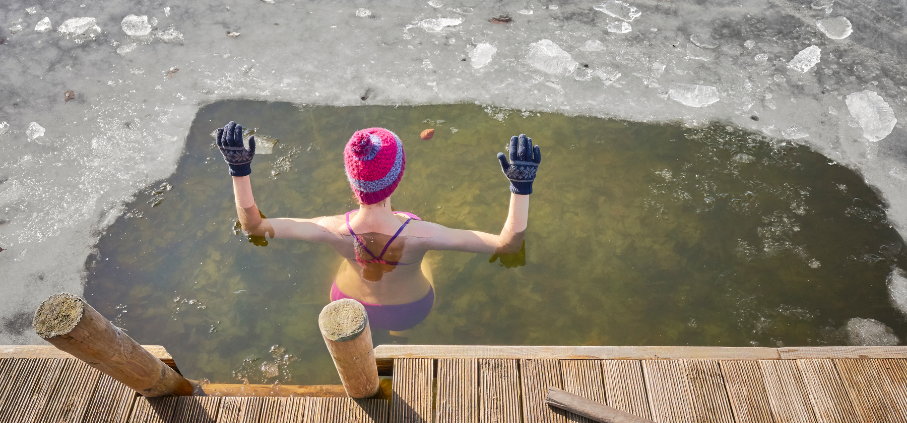
Cold plunging when you are sick is a great idea. Feed a fever, starve a cold…cold dive when Ill? While the colder months bring a festive mood, they can also herald seasonal illnesses.
According to the Johns Hopkins Medical Center, “colds, flu, and other respiratory illnesses occur more frequently during cold seasons” and affect both adults and children.
When you’re not feeling well, the idea of jumping into ice water may not seem appealing. But can they actually relieve symptoms and support your body in fighting the cold?
In this article, we look at the potential benefits of cold plunges and ice baths when you’re feeling unwell.
Will ice baths help fever?
Colds (contagious upper respiratory tract infections) are very common among children and adults. Studies have shown that, on average, adults catch a cold two to four times a year, a figure that increases during the cold season. Although colds can be a nuisance, most colds are harmless and go away on their own.
One of the first signs you have a cold is a fever, which is part of your immune system trying to fight off the infection. As your body makes the environment inhospitable to the virus, you may also experience unpleasant symptoms like fatigue, runny eyes and nose, aches and pains, chills, headaches, etc.
Although these symptoms are unpleasant, they are signs that your body is trying to recover from the virus. Thats why cold plunging is so good when you are sick.
The advantage of ice baths during illness
When you get sick, rest is essential for recovery. Cold plunges are perfect when you feel better, but you can relieve certain symptoms and provide some benefits to providing temporary relief.
Endorphin release
One of the benefits of cold plunging is that it helps release endorphins and dopamine, the “feel good” hormones in your brain. These chemicals play a vital role in helping to improve your mood and reduce stress.
Endorphins help reduce discomfort and are often thought of as the body’s natural painkillers. Taking them together can give you energy and temporary relief when you’re feeling unwell, and immediately following with a cold water immersion can enhance both effects.
Boost Your Immune System
Cold water immersion can also help boost your immune system. Exposure to cold, including cold water immersion, is associated with the creation of new mitochondria, which play a role in energy production and cellular health.
Cold exposure can also help increase the production of leukocytes, white blood cells that help fight infections.
Additionally, cold immersion is associated with stimulating the lymphatic system to help push fluid through the lymph nodes, which helps support the body’s natural detoxification process.
Potentially Improved Sleep
Cold immersion may improve sleep quality by influencing the body’s thermoregulation and nervous system.
Your circadian rhythm, which regulates your sleep and wake cycles, is calibrated daily based on a variety of factors, including sunlight and temperature changes.
A cold swim in the morning can help energize your body and kick-start your day, and helping to synchronize your circadian rhythms may improve your ability to fall asleep later and stay asleep through the night.
Will ice baths make you sick?
Although cold water immersion has many benefits for your health and wellbeing, it’s important to be careful if you’re sick: the added stress of exposure to the cold can take a toll on your body and impede your recovery.
During illness, rest and self-care should be a priority to support your body’s healing process. Once you feel better, you can safely resume your regular wellness routine.
Added Stress on the Body
Cold diving is a form of controlled stress on the body that has many benefits for a healthy body.
However, when your immune system is already weakened due to illness, added stress can make your symptoms worse. Your body’s resources are spent fighting the effects of the cold, leaving you with less energy to fight illness.
Respiration problems
Breathing is very important during cold immersion and helps manage your body’s response to sudden exposure to cold. Controlled breathing helps calm and regulate the physiological response to cold water.
When you’re fighting a cold, your nasal congestion and airways can become blocked, preventing you from breathing properly.
This impedes breathing and increases the risk of adverse effects during immersion.
Vasoconstriction increases body temperature
Although exposure to cold water may seem like a good way to reduce fever, it can actually have the opposite effect due to vasoconstriction.
When you are immersed in cold water, your blood vessels constrict and blood moves from your extremities toward your core in an effort to conserve heat.
However, this process unintentionally raises your core temperature, which can worsen fever symptoms and impede recovery.
Will ice baths lower blood pressure?
Immersing the body in extremely cold water causes an immediate cardiovascular response. The heart rate decreases, while blood pressure increases due to the constriction of peripheral blood vessels.
Cold immersion helps our bodies stay stable. It has incredible health benefits, including helping to align our circadian rhythm, boosting our mood, and improving sleep quality.
However, cold diving is best used as a preventative measure to stay healthy, not as a treatment for illness. Find the right diving model for your needs
By taking a cold bath in the comfort of your own home, you can create a routine that will help improve your physical and mental health. We offer a wide range of cold diving options with flexible financing plans designed to perfectly fit your lifestyle.
Learn more about our products (from compact pods to premium all-in models) and see how they can improve your health habits today.
Here NPR dives into the science of doing cold plunges when people are sick. If you want to read more about taking an ice bath. Here is some information about how long you should take an ice bath.